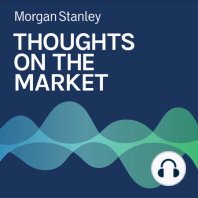3 min listen

Michael Zezas: Two Potential Catalysts to Watch for Fall Volatility
Michael Zezas: Two Potential Catalysts to Watch for Fall Volatility
ratings:
Length:
3 minutes
Released:
Sep 23, 2021
Format:
Podcast episode
Description
Why two D.C. policy items—the bipartisan infrastructure framework and debt ceiling deliberations—could add one more complication for equities markets.----- Transcript -----Welcome to Thoughts on the Market. I'm Michael Zezas, Head of Public Policy Research and Municipal Strategy for Morgan Stanley. Along with my colleagues, bringing you a variety of perspectives, I'll be talking about the intersection between US public policy and financial markets. It's Thursday, September 23rd, at 10:30 a.m. in New York. Markets this week have had a lot to focus on - from the Fed's policy decisions to fresh concerns about global growth. But expect that focus to shift next week, or possibly sooner, to events in Washington, D.C. In particular, watch out for two events that could catalyze some market volatility. First, keep an eye on the planned vote on the bipartisan infrastructure framework, or BIF for short. This vote, which could come as soon as Monday, is a key test for whether or not the Democrats will be able to 'go big' on fiscal policy. That's because the BIF - which would add about $550B of new spending over 10 years to the budget - was supposed to be paired with a bigger, budget reconciliation bill that could reach as high as $3.5T over 10 years. The linking of the two was meant to align the interests of moderate and progressive Democrats in Congress. But that reconciliation bill isn't ready yet for a vote alongside the BIF. So, if the smaller bill gets approved, the moderates will have gotten most of what they want and could be more demanding on the bigger bill, either stalling it or shrinking its size. At the moment, it's far from clear that the BIF can get enough votes to pass on its own, meaning the 'all or nothing' dynamic on fiscal policy remains intact. But if the BIF succeeds, that would suggest a smaller fiscal package, smaller deficit impact, and a key challenge to our view that bond yields will rise meaningfully into year end. We'd also keep a close eye on the deliberations around raising the debt ceiling and avoiding a government shutdown. While the 'x' date - the day by which the debt ceiling needs to be raised or suspended in order to avoid a payment default on Treasuries - is likely the more impactful deadline - which our economists expect will be late October, early November - markets may be more focused on September 30th, the date by which Congress must authorize a continuing resolution for new spending, or else the government shuts down. While we ultimately expect these issues to be resolved in a manner that doesn't materially impact the US growth outlook, the path to resolution on these issues likely requires escalated uncertainty in the near term. Since Democrats have paired the continuing resolution with a debt ceiling hike, which Republicans flatly oppose on the idea that Democrats should go it alone using reconciliation, there's no clear path forward at the moment. For example, the House just passed a continuing resolution, which the Senate is unlikely to be able to carry forward given insufficient Republican support. So, headlines around a government shutdown should pick up, and with it the takes that the situation increases the risk that the debt ceiling can't be raised in a timely manner. Taken together, these two concerns could weigh on the equity market, where our colleagues in cross-asset strategy have suggested performance could be sluggish in the near term as investors grapple with the transition from early to mid economic cycle dynamics. The shift from clear D.C. stimulus support to D.C. uncertainty could be one part of that shift. Thanks for listening. If you enjoy the show, please share Thoughts on the Market with a friend or colleague, or leave us a review on Apple Podcasts. It helps more people find the show.
Released:
Sep 23, 2021
Format:
Podcast episode
Titles in the series (100)
Andrew Sheets: For Markets, Signs, Signs, Everywhere Signs by Thoughts on the Market